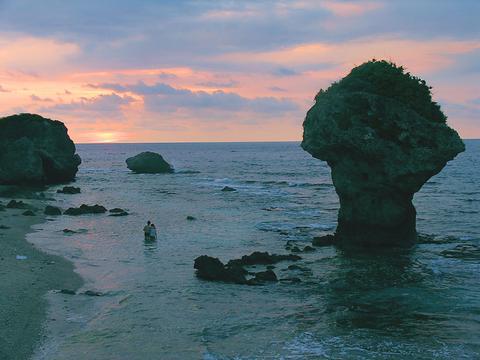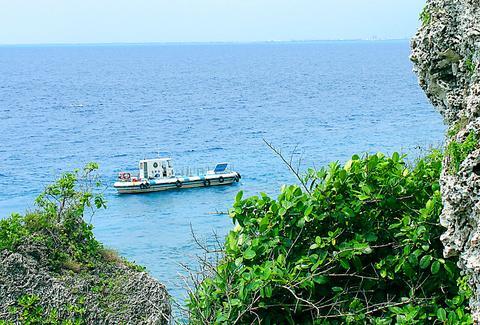Few of Taiwan's tourist destinations have the natural assets of Hsiao Liuchiu, (
A quick ride around the island reveals why: nearly every plot of "undeveloped" land has been taken up by graves. What's more, the nicer the plot -- with, say, a postcard view of the setting sun -- the more graves there are.
Liuchiu, as residents call it, is just 6.8km2 with a population of some 13,000 residing in eight villages. With just 10 surnames between them, they are keenly aware of just whose graves occupy their backyards. Most residents live on the northern side of the island near the harbor closest to Kaohsiung. The southern half of Liuchiu is mostly graves, interrupted by either an occasional village or one of the giant coral rock formations of which the island is composed.

PHOTO: DAVID MOMPHARD, TAIPEI TIMES
The living and dead so closely cohabitate the island that it is, in fact, against the law. Regulations established by the Ministry of the Interior state that burials cannot take place within 500m of a residence. But on an island that is just 4,000m long and 2,000m across, obeying this law would be next to impossible.
"Liuchiu has two problems," said Chen Chen-hua (陳振華), who operates a seaside resort and campground, the island's newest tourist development, "All the young people go over there," he says pointing to Kaohsiung on the horizon, "and all the old people go over there," he says pointing to the south of the island.
Chen explains that the young people leave mostly for better job opportunities on Taiwan, but also to escape an island famous for its ghosts.

PHOTO: DAVID MOMPHARD, TAIPEI TIMES
One of the main tourist attractions on Liuchiu is Black Spirit Cave (烏鬼洞), a sea-side park area made famous for its picturesque scenery and the story of what happened there centuries ago.
The story is carved in stone near the cave's entrance: "It was in 1661 (the 15th year of the Yong Li Ming Dynasty) national hero Koxinga (Cheng Chen-kung, 鄭成功), knighted as Yen Ping King, drove the Dutch and restored Taiwan and the Pescadores (Penghu). During the Dutch escaping, some negroes were separated from their unit and arrived at this island. They lived in this cave. Some years later, a British boat with soldiers landed at the place northeast of the cave. As they were enjoying the scenery, those negroes robbed their food and other things, burned the boat and killed all the British. It was discovered by the British warship that they landed this island and sought the murderers while the negroes hid in the cave. In spite of many threats, they refused to surrender. Finally, the British burned the cave with oil. Then, all the negroes died there in the cave. Later it was named as the Black Spirit Cave, which means the cave in which the foreign negroes had lived before. ...."
The inscription ends with a nod to Liuchiu's tourism ambitions: "To add more beauty for this island and to meet the development of tourism, we rebuilt it in the form of public building and made it more enjoyable."
Scholars now believe that the "negroes" in the story were actually Siraya Aborigines, who were related to tribes that lived in the area that is now Pingtung County as far back as 3,000 years ago.
Another of the island's main attractions is Beauty Cave (美人洞), named for the young daughter of a Ming loyalist who fled China to escape Manchu forces. He and his daughter hid out in this catacomb of coral grottoes, surviving off wild plants and fish until the day the father died. Local inhabitants later discovered the young girl weeping over her father's body. But rather than leave his side, according to the legend, she bit her tongue in half and took her own life.
The most remote of these grottoes is, yet again, famous for a tragic reason. It was the sight where, in the last century, locals disposed of unwanted baby girls. It's now marked by a shrine built in the girls' honor.
But ghost stories and tragic tales are hard to think of when the sun kisses the coral shores of Liuchiu and winks from the tops of waves. At the island's peak, on a clear day, it's possible to trace Taiwan's coastline from Kaohsiung in the north down the Hengchun Peninsula in the south. The living coral beneath the sea and the coral rock inland on the island mean adventure-seekers could spend several days getting happily lost. The beauty of Liuchiu is as beguiling as its ghost stories.

Taiwan has next to no political engagement in Myanmar, either with the ruling military junta nor the dozens of armed groups who’ve in the last five years taken over around two-thirds of the nation’s territory in a sprawling, patchwork civil war. But early last month, the leader of one relatively minor Burmese revolutionary faction, General Nerdah Bomya, who is also an alleged war criminal, made a low key visit to Taipei, where he met with a member of President William Lai’s (賴清德) staff, a retired Taiwanese military official and several academics. “I feel like Taiwan is a good example of

March 2 to March 8 Gunfire rang out along the shore of the frontline island of Lieyu (烈嶼) on a foggy afternoon on March 7, 1987. By the time it was over, about 20 unarmed Vietnamese refugees — men, women, elderly and children — were dead. They were hastily buried, followed by decades of silence. Months later, opposition politicians and journalists tried to uncover what had happened, but conflicting accounts only deepened the confusion. One version suggested that government troops had mistakenly killed their own operatives attempting to return home from Vietnam. The military maintained that the

Jacques Poissant’s suffering stopped the day he asked his daughter if it would be “cowardly to ask to be helped to die.” The retired Canadian insurance adviser was 93, and “was wasting away” after a long battle with prostate cancer. “He no longer had any zest for life,” Josee Poissant said. Last year her mother made the same choice at 96 when she realized she would not be getting out of hospital. She died surrounded by her children and their partners listening to the music she loved. “She was at peace. She sang until she went to sleep.” Josee Poissant remembers it as a beautiful

Before the last section of the round-the-island railway was electrified, one old blue train still chugged back and forth between Pingtung County’s Fangliao (枋寮) and Taitung (台東) stations once a day. It was so slow, was so hot (it had no air conditioning) and covered such a short distance, that the low fare still failed to attract many riders. This relic of the past was finally retired when the South Link Line was fully electrified on Dec. 23, 2020. A wave of nostalgia surrounded the termination of the Ordinary Train service, as these train carriages had been in use for decades